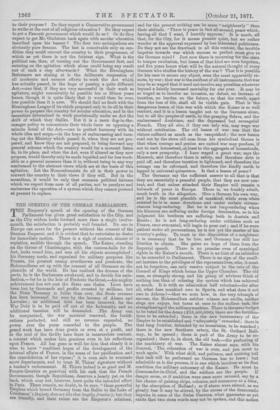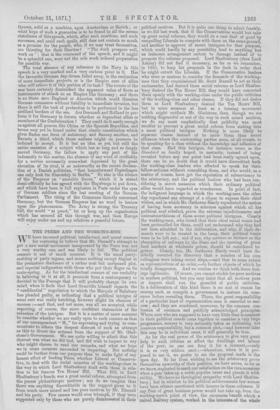THE OPENING OF THE GERMAN PARLIAMENT. T HE Emperor's speech at
the opening of the German Parliament has given great satisfaction to the City, and as the City seldom looks forward more than a single twelve- month, the satisfaction is probably well founded. No one in Europe can move for the present without the consent of the German Emperor, and it is evident that he entertains no desire for immediate motion. There is a sigh of content, almost of repletion, audible through the speech. The Kaiser, standing on the throne of Charlemagne, with the cannon-balls for its feet, looks round him, and sees all his objects accomplished ; his Germany made, and organized for military purposes like Prussia, his greatest enemy overthrown and prostrate, the Hohenzollerns set up with the consent of all Germans on the pinnacle of the world. He has realized the dreams of the poets, he is the Barbarossa awakened, and to double his satis- faction,—for he is the heir of Frederic the.Great,—his mighty achievement has not cost the State one thaler. Lives have been lost by thousands and profits arrested by millions, but the State Treasury is fuller than ever, the State revenue has been increased for ever by the income of Alsace and Lorraine ; no additional debt has been incurred, for the War Debt is to be paid off out of the Indemnity, and no additional taxation will be demanded. The Army can be reorganized, the war materiel renewed, the fortifi- cations perfected, and still no revenue expended, no power over the purse conceded to the people. The grand work has been done gratis or even at a profit, and in the soul of the thrifty hero there is measureless content, a content which makes him gracious even in his reflections upon France. All has gone so well for him that clearly it is wise to have " confident hopes of the development of the internal affairs of Franco, in the sense of her pacification and the consolidation of her repose ;" it is even safe to evacuate more departments, and to trust M. Thiers' signature without a banker's endorsement. M. Thiers indeed is so good and M. Pouyer-Quertier so punctual with his cash that the French Government, though Republican, deserves a hearty pat on the back, which may not, however, have quite the intended effect in Paris. There remain, no doubt, to be sure, " those powerful Empires which bound Germany from the Baltic to the Lake of Constance" (M ajesty does not like that lengthy frontier); but they are friendly, and their rulers are the Emperor's relations, and for the present nothing can be more "neighbourly " than their attitude. There is peace in fact all around, peace which, having all that I want, I heartily approve.' It is much, all that, for the City, for it means present quiet, but we rather wonder at the approval expressed by less interested politicians. Do they not see the drawback to all this content, the terrible impetus towards war which success so perfect must give to- the German mind ? Just now there is mourning for the slain to temper exultation, but losses of that kind are soon forgotten, and five years hence what will be the natural thought of every German who studies the history of the war ? That it is possible- for his race to secure any object, even the most apparently re- mote, by war; that war is the swiftest of all instruments, that war may be so waged that it need not involve any penalties whatever beyond a faintly increased mortality for one year. It may be so waged as to involve no invasion, no defeat, no increase of taxation, no burden on the future, so that the result, apart from the loss of life, shall all be visible gain. That is the dangerous lesson of this war with which the Kaiser is so well content, and it is a lesson taught not to the Germans alone, but to all the peoples of earth, to the grasping &lays, and the embarrassed Austrians, and the depressed but revengeful French. They all also, if they can only win, may wage war without retribution. The old lesson of war was that the victors suffered as much as the vanquished ; the new lesson read out by the stern old man from his symbolical throne is that when courage and genius are united war may produce, if: not to each homestead, at least to the aggregate of homesteads, only a new prosperity. I have waged a great war, says the Monarch, and therefore there is safety, and therefore debt is paid off, and therefore taxation is lightened, and therefore the coinage can be reformed, and therefore the kindly earth is. lapped in universal quiescence. Is that a lesson of peace ?
The Germans say the sufficient answer to all that is that- they are essentially a peaceful people, that they are now con- tent, and that unless attacked their Empire will remain a. bulwark of peace in Europe. There is, we frankly admit, much truth in the allegation. Give a German his own way, and he is the most placable of mankind, while even when resisted he is in some directions and under certain circum- stances long-enduring. But he is not long-enduring when his kinsmen are suffering under foreign domination, as in his judgment his brethren are suffering both in Austria and. Russia ; he is not long-enduring under criticism such as France, once evacuated, will begin to pour out ; and if he were patient under all provocations, he is not yet the master of his• country's policy. To trust in the disposition of a neighbour it is necessary that he be free, and Germany has still her- liberties to obtain. She gains no hope of them from the Imperial speech. There is no promise even of municipal rights in the Kaiser's mouth. There is no hint of an initiative to be conceded to Parliament. There is no sign of the small- est increase to the privileges of the representatives,who, it must not be forgotten, can only resolve subject to the veto of the Council of Kings which forms the Upper Chamber. The old man, so strangely strong, and his group of advisers think of nothing less than of relaxing the system which has achieved so much. It is with an admiration half reluctant—for after all, what does mankind owe to Sparta, and what does it not owe to Athens I—that we note how, in the very triumph of success, the Hohenzollern neither relaxes nor exults, neither sings nor enjoys, but turns at once to the endless task, the strengthening of the military machine. There is the same budget to be voted for the Army (i13,500,000); there are the fortifica- tions to be extended ; there is the new bureaucracy of the Empire to be established and "adequately" rewarded ; there is- that long frontier, defended by no mountains, to be watched ;. there is the new Southern artery, the St. Gothard Rail- way, to be opened ; there is part of the Army to be re- organized ; there is, in short, the old task,—the perfecting of the machinery of war. The Kaiser almost says, with his General, The relaxation of war is over, and you must to work again.' With what skill, and patience, and untiring toil that task will be performed no German has to learn ; but admirable as is the process, it is one which involves as its first condition the military autocracy of the Kaiser. He must be Commander-in-Chief, and the soldiers are the people. If danger arose, or if ambition were once more aroused, say by a fair chance of gaining ships, colonies, and commerce at a blow, by the absorption of Holland ; or if alarm were stirred, as we greatly fear it may be stirred, by the excess of the democratic impulse in some of the Swiss Cantons, what guarantee as yet, exists that two stern words may not be spoken, and this nation
thrown, solid as a machine, upon Amsterdam or Zurich ; or what hope of such a guarantee is to be found in all the serene stateliness of this speech, which, after such exertions, and such successes, and amid such spoils, still does not contain so much as a promise for the people, who, if we may trust themselves, are thirsting for their liberties ? " The work prospers well, work on " ; that is the command of the speech, and it might be a splendid one, were not the sole work ordered preparation for possible war. The total absence of any reference to the Navy in this speech is a very marked and a very curious point in it. Has the favourite German day-dream faded away, in the realization of more immediate projects, or is the Empire sure of allies who will relieve it of this portion of its task ? The events of the war have certainly diminished the apparent value of fleets as instruments of attack on an Empire like Germany ; and there is no State save England or America which could threaten German commerce without liability to immediate invasion, but there is still the task of protection to be performed in the less civilized borders of the sea. Are Denmark and Holland to per- form it for Germany in future, whether as dependent allies or members of the Confederation ? They could do it easily enough as against all powers like China or the Spanish Republics, and terms may yet be found under that elastic constitution which gives Baden one form of autonomy, and Saxony another, and Bavaria a third, which those nations might on pressure be induced to accept. It is but an idea as yet, but still the entire omission of a subject which has so long and so deeply moved Germany, the failure to apply any part of the indemnity to the marine, the absence of any word of cordiality for a service necessarily somewhat depressed by the great elevation of its rival, is as noteworthy as the recent declara- tion of a Danish politician, " that henceforward Copenhagen can only look for friendship to Berlin." So also is the silence of the Emperor on "anarchic forces," which it is stated demi-officially he has agreed with the Hapsburgs to put down, and which have been in full explosion in Paris under the eyes of German soldiers since the last meeting of the German Parliament. The rising of the Commune directly concerned Germany, but the German Emperor has no word to bestow upon the phenomenon. The Army is strong, the Treasury full, the world " at peacb," let us keep up the organization which has secured all this through war, and then Europe will enjoy under me and my relatives a peaceful future.



































 Previous page
Previous page